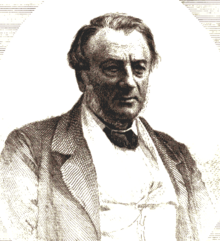Barthélemy Prosper enfantin
Barthélemy Prosper Enfantin (born February 8, 1796 in Paris , † 1864 ) was a French philosopher, socialist and the main representative of the religion saint-simonienne .
Live and act
Barthélemy Prosper Enfantin, the favorite student of the socialist Saint-Simon and one of the founders of Saint-Simonism , was educated in a lyceum, later (1813) in the polytechnic school and then visited Belgium, Germany and Russia as a wine traveler. In 1821 he joined a bank in St. Petersburg, but returned to Paris in 1823, where he became a cashier at the mortgage bank.
A close alliance of friendship with Olinde Rodrigues led him to study the writings of Saint-Simons, whose eager students both became. In 1825 they founded a limited partnership to maintain the journal Le Protecteur , in which Enfantin Saint-Simons developed ideas.
Little by little , a circle of supporters formed around him and Saint-Amand Bazard , especially after the latter's public lectures (1829). The Saint-Simonist school was founded, and in the Collège, the association of initiates, Enfantin and Bazard were consecrated to be great fathers (pères suprèmes).
However, each of them drew different conclusions from the teachings of their dead master. Bazard adhered to the philosophical-political side of the same, while Enfantin pursued the philosophical-social direction.
He turned the principles into dogmas, the school into a church and the teaching corps into a priesthood, a hierarchy. He divided humanity into two classes, the philosophical or the calm and the sensitive or agile; he declared the laws drawn up by society to be unjust against the latter, particularly with regard to marriage.
He demanded the emancipation of women, the complete equality of women with men, and also defended freedom of sexual intercourse in the development of the cynical theory of a double priest.
On this point a dispute broke out among the heads of the school in 1831, and the political part of the sect with Bazard separated from the man of the flesh , while the social faction stuck together with Enfantin, who was from now on called Le Père and was supported by his preachers the living law , a kind of Messiah, explained.
When the society turned away with disgust from his new teachings, Enfantin withdrew with some 40 followers who remained loyal to him to his property in Ménilmontant and organized a patriarchal-socialist society there according to his new teachings.
The state authorities saw in the connection a violation of the association law, but at the same time also of public morality and good manners and put Enfantin and his comrades (including Rodrigues, Michel Chevalier , Duveyrier, Barrault etc.) in front of the assises . Enfantin was sentenced to one year in prison and a fine of 100 francs. The connection was broken, and Saint-Simonism was destroyed. After a few months of imprisonment, Enfantin went to Egypt with several of his followers in March 1834 to convey his ideas to the viceroy via a Suez Canal , but he did not succeed. Instead, his followers were employed there as Pasha's engineers on the Nile dams.
When he returned to France, he got a job as a postmaster and then went to Algeria as a member of the scientific commission charged with investigating the question of colonization. In his writing Colonization de l'Algérie (Paris 1843) he gave a clear discussion of the question.
After the February Revolution he edited another journal, Le Crédit public , which had much of the old Saint-Simonist spirit in it, but which soon died out due to lack of money. Later he was employed by the administration of the Lyon Railway.
In order to pursue his idea of a Suez Canal further, he founded the Société d'Études du Canal de Suez in 1846 , in which Paulin Talabot , Robert Stephenson and Alois Negrelli were also involved.
His works were published in 17 volumes together with those of Saint-Simon (Paris 1865 ff.). Enfantin is buried in the Père Lachaise cemetery.
Works (selection)
- Économie politique et Politique Saint-Simonienne 1831
- Morale 1832
- Le livre nouveau 1832
- La religion Saint-Simonienne 1831
literature
- Arno Münster: The subject of revolt in the work of Jules Vallès . A contribution to the sociology of commune literature . Fink, Munich 1974, ( Freiburg writings on Romance philology 25, ZDB -ID 500205-9 ), (About Enfantin and Saint-Amand Bazard: pp. 30–32)
Web links
- Literature by and about Barthélemy Prosper Enfantin in the catalog of the German National Library
| personal data | |
|---|---|
| SURNAME | Enfantin, Barthélemy Prosper |
| BRIEF DESCRIPTION | French philosopher and socialist |
| DATE OF BIRTH | February 8, 1796 |
| PLACE OF BIRTH | Paris |
| DATE OF DEATH | 1864 |
